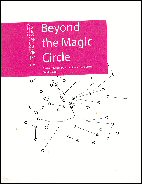
Beyond the magic circle : A network perspective on role-play in online games / Marinka Copier - [S.l.] : [s.n.], 2007 - Doctoral thesis Utrecht University

 |
Beyond the magic circle : A network perspective on role-play in online games Beyond the magic circle : A network perspective on role-play in online games / Marinka Copier - [S.l.] : [s.n.], 2007 - Doctoral thesis Utrecht University |
Currently, game research is characterized by the (re)construction of contested boundaries such as the "magic circle" of the game experience. These boundaries create dichotomies, for instance, between the real and the imaginary that hide the complexity of actual play, design and research. In this thesis I propose to go "beyond the magic circle" in order to understand games and play from a network perspective. My case study is role-play in the online game World of Warcraft (Blizzard Entertainment 2004), whereby players act out the roles of their Fantasy characters. I understand Massively Multiplayer Online Role-Playing Games (MMORPGs) as networks of social interaction in which players (human actors) interact both with each other and with the system (nonhuman actors). Through interaction, role-players are creating meaning and social bonds that stretch out far beyond dichotomies such as in-character and out-of-character, in-game and out of game, real and imaginary, leisure and work or education, virtual and material, online and offline. The emergence of Fantasy role-playing games, of which the pen and paper game Dungeons and Dragons (D&D, 1974) is the first and World of Warcraft (WoW, Blizzard Entertainment, 2004) is one of the latest incarnations, ties in with the development of what sociologist Manuel Castells termed the network society. Through rich empirical case studies in his trilogy The Information Age: economy, society and culture (1996, 1997 and 1998), he mapped how since the late 1960s we have been witnessing a shift from hierarchies to networks in all sectors of society. Castells' work is part of a growing body of network theory in which our society, including science itself, is understood as a complex system shaped by processes within and between actor networks that are often powered by information and communication technologies. In order to study MMORPGs as networks, I made use of Actor Network Theory as it is formulated within science and technology studies (Callon 1986, Law 1987, Latour 1987, 2005), Thomas Gieryn's concept of boundary work (Gieryn 1983, 1999), Erving Goffman's work on social interaction (Goffman 1956, 1974), and the concept of "situatedness," a crucial addition that Donna Haraway made to network theory, which aims to make visible how scholars are positioned in constantly morphing network structures (Haraway 1991). This thesis contributes to 1) an understanding of online role-playing games as networks that interact with daily life, Fantasy game culture, and the broader technological and socio-cultural developments over the last thirty years; 2) a description and analysis of role-play as a specific MMORPG play style that is characterized by its negotiation principles, and thus to understand the roles, conventions, identities, and interpersonal relationships that self-proclaimed role-players negotiate in and through the systems of a commercially distributed game; and, finally, 3) an understanding of how collaborative play, design, and game research are closely intertwined. Going "beyond the magic circle" has profound implications for both epistemology and education in game research and design. A network epistemology asks for interdisciplinary academic work that combines not only scholarship from the humanities and social sciences, but also from computer sciences. Furthermore, it calls for a societal contextualization of scholarship and a connecting of fundamental and applied theorization both "inside" and "outside" academia, done by players, designers, and academics, roles that more often can be found in one person. A networked education teaches a specialization in the context of other research and design disciplines, as the ability and passion to create unexpected blends is crucial for future innovative developments in play, design, and research. keywords: Massively Multiplayer Online Role-Playing Games (MMORPGs), computergames, online communities, virtual worlds, magic circle, role-play, network theory, network society, actor-network theory |